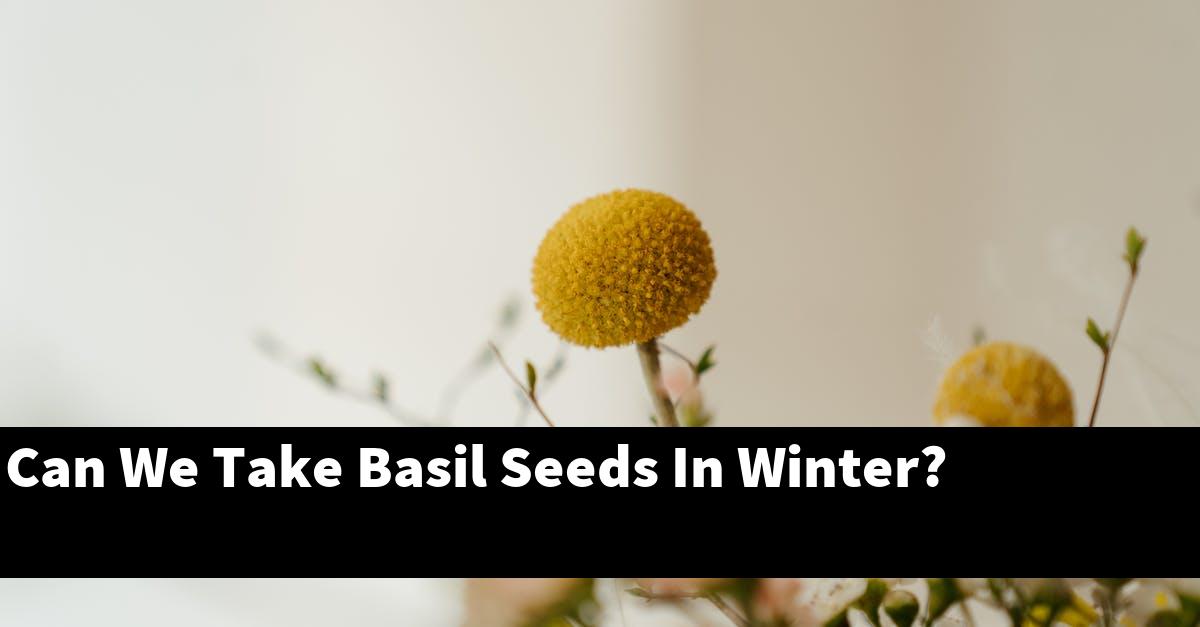Basil seeds, also known as tukmaria or sabja seeds, are the seeds of the basil plant. They are black in color and have a diameter of about 2 millimeters.
Basil seeds are used in Ayurvedic and Chinese medicine. They are believed to have many health benefits, including the ability to improve digestion, lower cholesterol, and treat respiratory problems.
Is basil seeds good in winter?
Basil seeds are a good addition to winter gardens because they are hardy and can tolerate cold temperatures. They grow well in cool weather and can be planted in late winter or early spring.
Basil seeds can be sown indoors or outdoors and will germinate in about 14 days. Once the basil plants are established, they will need regular watering and fertilization.
How do you use frozen basil?
Frozen basil can be used in a variety of dishes, including pesto, quesadillas, and pastas. Frozen basil can be added to sauces or soups to give them a refreshing flavor.
Frozen basil can also be used as a garnish on foods.
How to make basil seeds?
Basil is a popular herb for cooking and adding flavor to food. Basil seeds are a type of seed that is used to grow basil plants.
Basil seeds can be germinated in water or soil. Once germinated, the basil seeds will need to be placed in a pot and given water and sunlight.
After a few weeks, the basil seeds will be ready to be planted in the ground. Basil plants can be grown in a garden or pot.
Does basil seeds have side effects?
Basil seeds are generally considered to be safe for humans, with the exception of pregnant women, who should avoid consuming large amounts of basil seeds. Basil seeds may cause mild side effects such as stomach discomfort, gas, and diarrhea.
When should i bring my basil indoors?
Basil (Ocimum basilicum) is a hardy annual herb that typically grows in warm climates. In the northern hemisphere, basil should be brought indoors in the fall and winter to protect it from cold weather.
Basil can be propagated from stem cuttings taken in the summer or early fall.
3 Best time to take basil seeds for weight loss
Basil is a popular ingredient in many weight loss recipes and supplements. Basil seeds are a good source of antioxidants and other nutrients that may help promote weight loss.
Basil seeds are small, so they are easily absorbed by the body. Basil seeds can be eaten as part of a weight loss diet or added to a supplement.
What is the best time to take basil seeds?
Basil (Ocimum basilicum) is a flowering plant in the family Lamiaceae, native to the Mediterranean region. It is a hardy annual that can be grown in temperate climates.
Basil is used as a flavoring in food, as a natural pesticide, and as an ornamental plant.
The optimum time to sow basil seeds will vary depending on the climate in which they are to be grown, as well as the variety of basil seed being used. In general, though, basil seeds should be sown in early spring, and will germinate quickly and grow into strong plants by mid- to late spring.
Can you grow basil in water in the winter?
Basil can be grown in water in the winter, but it will not produce as much basil as when grown in soil. Soil contains nutrients that help the basil grow vigorously.
How do you grow basil from a package?
Basil is a popular herb that can be found in many grocery stores. Basil can be grown from a package, but it is not easy.
The best way to grow basil is to start with a small pot and then gradually increase the size of the pot as the plants grow. Basil needs a lot of sunlight and needs to be watered regularly.
Once the plants are mature, they can be transplanted into a larger pot.
Is sabja seeds hot or cold?
The seeds of the sabja plant are hot and can be irritating to the skin.
Final Thoughts
Yes, you can take basil seeds in winter. They are a good source of vitamins and minerals, and they can help improve your digestion.

